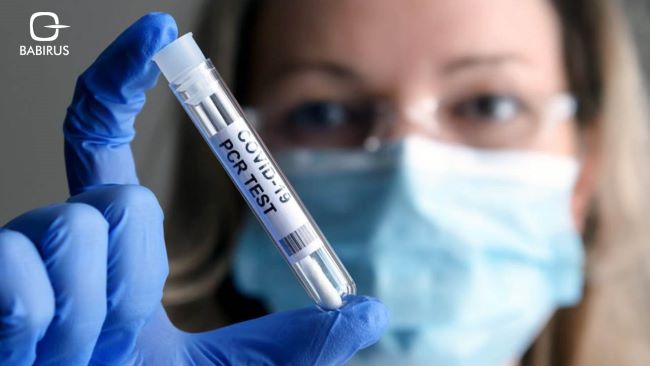PCR Test vs. Molecular Test: The Differences and More!

Various types of diagnostic tests are used based on every condition and what it requires. Moreover, the PCR test vs. Molecular test are the most common and used tests in most healthcare facilities.
When it comes to diagnosing infections like SARS-CoV-2, two main types of tests are commonly used: Polymerase Chain Reaction (PCR) tests and molecular tests. While both are molecular tests, there are key differences in how they work and their strengths and weaknesses.
Stay with us to know all about the PCR test vs. molecular test, including differences, benefits, and more!
Understanding PCR Tests:
Polymerase Chain Reaction (PCR) testing has been one of the basic COVID-19 test types in the fight against the COVID-19 pandemic, allowing for diagnostic test accuracy of the SARS-CoV-2 virus.
PCR is a laboratory technique that increases specific segments of genetic material, enabling the identification of pathogens like viruses with high sensitivity. Understanding how PCR works and interpreting its results is crucial in diagnosing infections and implementing appropriate public health measures.
What Is PCR Testing?
PCR is a molecular diagnostic test used to amplify DNA segments, making it possible to detect and analyze specific genetic material.
By using primers that match segments of the virus’s genetic material, PCR can create multiple copies of viral DNA for detection.
- Detection Method:PCR tests detect the presence of the virus by amplifying its genetic material. This involves converting RNA from the virus into DNA through a polymerase chain reaction.
- Diagnostic Test Accuracy:PCR tests are highly sensitive and accurate, with an accuracy rate approaching 100%. They can detect even small amounts of viral genetic material in a sample.
- Process:The amplification process in PCR tests requires specialized equipment and skilled technicians. It involves multiple heating and cooling cycles to create billions of copies of the viral DNA for detection.
- Speed:How long does it take to get PCR test results? PCR tests can take longer to produce results, typically ranging from 12 hours to five days due to the complex amplification process and centralized testing facilities.
- Cost:If you are wondering what are the limitations of PCR tests? Then we can say that PCR tests tend to be more expensive, costing around $100 or more per test due to the need for specialized equipment and trained personnel.
The Importance of PCR Testing in Healthcare:
- Accurate Diagnosis: PCR testing provides highly accurate results, aiding in the precise diagnosis of infectious diseases and other conditions.
- Early Detection: Allowing for fast treatment and containment of outbreaks.
- Monitoring Disease Spread: PCR testing helps healthcare authorities monitor the spread of diseases within communities, facilitating targeted intervention measures.
- Guiding Treatment Decisions: Results from PCR tests inform healthcare professionals about the most effective treatment options for patients.
- Screening and Prevention: PCR testing is vital for screening high-risk populations and preventing the transmission of diseases, especially in places like hospitals and long-term care facilities.
Deciphering Molecular Tests:
In the world of healthcare and biotechnology, molecular tests are essential tools for diagnosing various diseases, including viral infections like SARS-CoV-2.
These tests play a crucial role in identifying active infections, guiding treatment decisions, and controlling the spread of infectious diseases.
Moreover, understanding the details of molecular diagnostic technologies is vital for healthcare professionals, researchers, and individuals alike.
What Are Molecular Tests?
Molecular tests are instrumental in detecting specific genetic sequences or proteins associated with pathogens in patient samples. In the case of SARS-CoV-2, molecular diagnostic techniques are used to identify the presence of the virus in individuals, enabling healthcare providers to diagnose active infections accurately.
- Detection Method:Molecular tests, including PCR, detect the virus by analyzing its genetic material. They rely on nucleic acid amplification techniques to identify specific sequences unique to SARS-CoV-2.
- Diagnostic Test Accuracy:Molecular tests are known for their high accuracy in detecting viral genetic material, making them reliable for diagnosing infections like COVID-19.
- Variety:Molecular tests encompass various techniques beyond PCR that can also detect other viruses like influenza or RSV. Some can even identify multiple viruses in a single sample.
- Applications:Molecular tests are used not only for diagnosis but also for screening asymptomatic individuals with potential exposure to the virus or those in high-risk environments.
The Importance of Molecular Tests in Healthcare:
- Genetic Profiling: Molecular tests allow for comprehensive genetic profiling, enabling healthcare providers to assess an individual’s genetic makeup for personalized treatment strategies.
- Disease Risk Assessment: These tests help in assessing an individual’s risk for hereditary diseases and conditions, facilitating early intervention and preventive measures.
- Pharmacogenomics: Molecular tests provide insights into how an individual’s genetic makeup influences their response to medications, allowing for optimized drug selection and dosing.
- Infectious Disease Detection: Molecular tests are important for the rapid and accurate detection of infectious agents, including viruses, bacteria, and fungi, aiding in timely treatment and outbreak control.
- Cancer Screening and Monitoring: Molecular tests play a crucial role in cancer screening, diagnosis, and monitoring, offering targeted approaches for precision oncology and personalized cancer treatment plans.
Last but not least,
When talking about the PCR tests vs. molecular tests then we are talking about vital tests that serve the purpose of detecting active infections of SARS-CoV-2 and more by analyzing genetic material.
However, if you are wondering is a PCR test more expensive than a Molecular test? The answer is that PCR is a specific type of molecular test known for its high sensitivity and accuracy but may be slower and more costly compared to other molecular testing methods.
